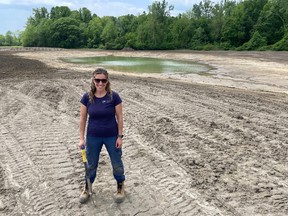
Article content
A 14-acre natural environment restoration project at the Jack Miner Migratory Bird Sanctuary in Kingsville aims to increase resting places for migratory birds and provide other environmental benefits.
The project, run by the Essex Region Conservation Authority, will see a wetland, adjacent meadow and forest take the place of farmland that was prone to flooding.
Advertisement 2
Article content
Article content
“You have existing good quality forest habitat here,” said Kate Arthur, restoration biologist for ERCA. “It’s very fragmented in Essex County. We have all these little patches and they’re not very big, so … we can build on a significant chunk of habitat that’s already here and create that connection. We’re helping this forest because we’re creating more interior as opposed to all this edge forest.
“We’re actually building on an existing chunk of really good quality Carolinian habitat, which is a big deal for us. That makes it a high priority.”
The project, intended to restore the land to its natural state, will increase biodiversity and natural cover areas and provide more wildlife habitat, including for species at risk, she said.
The bird habitat is helpful for the area, said Thomas Coke, executive director of the sanctuary, which objected to the suggestion of a geese cull in Windsor earlier this year to address problems with the bird population.
“One of the best places to do that is give (the geese) places to live that are natural — a 14-acre wetland that they can hang out in and they’ll have everything that they need.”
Article content
Advertisement 3
Article content
Restoring natural habitat in Essex County is a key ERCA goal because only 8.5 per cent of the region’s land is considered native, and the United Nations has set a goal of 12 per cent, said Arthur.
An acre of wetland will capture water from the surrounding agricultural area and act as a filter before it migrates into the surrounding forest and swamp, Arthur said.
The surrounding berm and meadow, about 1.5 acres, will have a couple of dozen different species of native grasses and wildflowers — such as cattails, swamp milkweed and other plants — to help filter water and provide habitat for wildlife, act as pollinators and attract nesting birds.
“We’re trying to maximize biodiversity,” said Arthur.

Adjacent to that will be a newly planted 11.5 acre forest, with 8,400 seedlings of oak, hickory, sycamore, maple, white pine, red cedar and other species.
“A majority of Essex County is privately owned so for us to put more habitat in the ground is really important (and) we can work with private landowners who are willing to be good stewards of the land,” said Arthur. “Jack Miner is a very good fit.”
Advertisement 4
Article content
“This project fits the direction of the sanctuary because we are taking land that once was wetland and restoring it to its former glory,” said Coke in an ERCA release. “This wetland fits our vision of conservation and our founder Jack Miner would have approved of the effort.”
Recommended from Editorial
Scarlet ammannia, an endangered wetland plant species, short-eared owls, barn swallows, bobolinks, eastern meadowlarks, blanding’s turtles, snapping turtles, monarch butterflys and eastern foxsnakes as just some of the species-at-risk that will benefit from this project, Arthur said.
A report published in 2019 by the United Nations Intergovernmental Science-Policy Platform on Biodiversity and Ecosystem Services gave an ominous warning about declining natural habitat. “The health of ecosystems on which we and all other species depend is deteriorating more rapidly than ever,” said IPBES Chair Robert Watson in the report. “We are eroding the very foundations of our economies, livelihoods, food security, health and quality of life worldwide.”
Funding for the Jack Miner project is being provided by Ducks Unlimited Canada, the Ontario Ministry of Environment, Conservation and Parks Forests Ontario, Ontario Power Generation and the Canadian Wildlife Federation.
Article content





